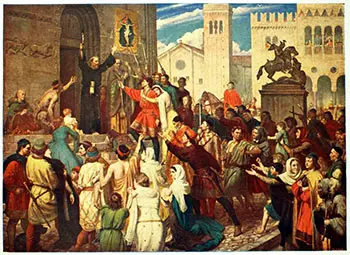Peter the Hermit
Peter the Hermit was a French monastic founder and preacher from the middle ages. He is widely considered one of the most vocal advocate and preacher of the First Crusade. Peter is also remembered for leading the People’s Crusade to the east along with Walter Sans Avior.
Their ill fated People’s Crusade reached east before the main armed contingents of the First Crusade. His fiery oration aroused the emotions of paupers (impoverished masses) and compelled them to undertake the journey with him to the east as the part of People’s Crusade. Peter also delivered a rousing speech to the tired and exhausted crusaders during the Siege of Antioch which resulted in a miraculous victory against a bigger and better equipped Muslim Army.


Early Life: Very sketchy information is available about the early life of Peter the Hermit. He was born around 1050 in France. Some authors have written that his father was Renauld L’Ermite from the city of Auvergne and his mother’s name was Alide Montaigu from Picardy.
There are also some historians who contended that he belonged to the L’Ermite family of Netherlands but there is not much evidence to support this theory. It is believed that surnames did not exist during his time and ‘Hermit’ was most probably Peter’s title not surname. According to Anna Comnena, Byzantine princess, historian and daughter of Byzantine Emperor Alexios I, Peter tried to visit Holy Land a few years before the First Crusade.
He was however; stopped by Seljuk Turks and was treated shabbily. Not much else is known about his early years.

Role in First Crusade: In 1095, Pope Urban II arranged Council of Clermont where he strongly preached The First Crusade. Peter the Hermit was present at the Council of Clermont, according to certain historians and started supporting the First Crusade immediately after.
He became the biggest proponent of the Crusade and used his blistering sermons to rouse the public support in for the First Crusade. His sermons greatly inspired the peasants, who took up the cross on his urging. Peter decided to lead his group of followers to the east as a group of purified and pious pilgrims who would be defended by the Holy Ghost. However, some historians believe that Peter’s People’s Crusade had well armed soldiers and nobles as well among its ranks.
Peter started his journey with 40,000 supporters from Cologne in April, 1096 and reached Constantinople in July with close to 30,000 ‘crusaders’. A large number of pilgrims starved to death during the journey and some were taken as slaves by the Slavic robber barons who sold them later in slave markets. Peter reached Constantinople with the remaining followers and camped outside the city.
Byzantine Emperor Alxius I was not happy with their arrival as he was now responsible for the pilgrims’ care and rations. Sensing growing disturbance, Alexius arranged for the transportation of pilgrims across Bosporus, into Turkish area. He asked crusaders to wait for his guards for safe passage through Turkish jurisdiction but the clamoring mob entered Turkish territory without waiting for his forces to reach them. Turkish forces ambushed pilgrims and massacred the ill equipped paupers in the Battle of Civetot.
Peter returned to Constantinople to seek help from Alexius I. However, Byzantine Emperor refused to offer any help. When the armed contingents of princes reached Constantinople, Peter joined their council and marched with them through Asia Minor to Jerusalem. However, by now the number of his followers had shrunk considerably and he contributed solely through delivering sermons to the crusaders. He subsequently played a subordinate role in the First Crusade.
His role in rousing crusaders into securing a decisive victory during the Siege of Antioch was nonetheless a high point for him.

Later Life and Death: Very little is known about Peter’s life after the First Crusade. It is believed that he died around 1115. He founded the Augustinian monastery in Flanders. His tomb is in Neufmoustier Abbey near Flanders.
Many historians regard Peter the Hermit as the primary instigator of the First Crusade.




